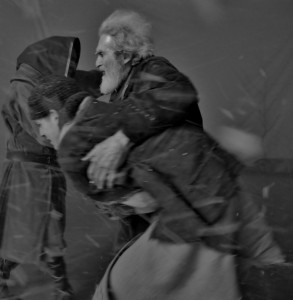Actor, director, filmmaker, Alexander Barnett is working on an exciting new film adaptation of King Lear. You can find more details at:
https://www.facebook.com/KingLearFilm
Here is his director’s statement:
“Today, wherever you turn, the world is erupting in violence: murder, torture, rape, carnage. The list of atrocities seems endless. More and more we see life treated cheaply, brutally, in such a meaningless way. The pain and suffering are beyond belief. In spite of this, as a director and filmmaker, I’ve always believed that artists can make a difference.
When I formed my first theatre company and directed my first play 45 years ago, I wrote on the programs: “Our goal is to travel the world and present the greatest plays ever written, plays that have meaning, that purge the soul. We will represent an idea; that every life sustaining emotion stems from love; that empathy and humanity are fundamental to most great art because only those qualities can tell you what other people feel and experience.” Ever since, this has been on the program of every show I’ve done. Naïve and quixotic perhaps but I still believe every word.
If directed to highlight theme, character and motivation, as a film King Lear could be revelatory in a way not possible on stage. Its themes are profound: The search for the ultimate power that determines human nature. The myth of universal justice. The meaninglessness of existence unless used for a higher purpose. Revelation of character through adversity. Learning to govern oneself before governing others. The search for self-realization. The immensity of accident and the unforeseen in the battle between good and evil. The search for the meaning of life. King Lear is an in-depth study of love, power and death.
I believe that through this play Shakespeare is saying, “Don’t blame the gods or the heaven’s for the horrors committed on earth. No. Blame hellish inhumanity on those who inhabit the earth.”
King Lear speaks to all of these issues more brilliantly than any other work. I consider it Shakespeare’s greatest play – indeed, the greatest work in all of English literature. I know of no other that encompasses all those monumental themes. In the entire Shakespearean canon there is no more demanding a play and no more demanding a role than that of Lear.
I have directed three productions of King Lear and performed the title role, both in the United States and Europe, more than 300 times. I love the play more than any other and, since my first production, it has been a major goal to create it on film. The time has come.
The play takes place in 800 B.C. It is a cruel, stone world. Archaic. Dark, ominous and foreboding. King Lear has led Britain for 60 years. His rule has exemplified integrity, generosity, humanity and dignity, resulting in a long, successful period of tranquility and peace. He has earned the respect and admiration of his people as well as the enormous love and devotion Kent and Cordelia feel for him. Gradually over the past decade however, he has become impervious to reality. He has permitted himself to be inundated with lies, flattery, unchallenged obedience and false adoration. He who most needed and demanded truth—he whose inner being was so honest, trusting and ethical—has learned to compromise his integrity, thriving on lies while his subconscious, his essence, have been devastated. He has denied himself his most important need: self-realization.
At the opening, Lear is not insane, (tragedy emanates from character, not disease – unless it is a disease of character), but his mind is very vulnerable to mental disorder. His psychological state is such that he is often incapable of controlling his strongest emotions. He is aware of this lack of control. Even as he indulges it, he fears the consequences. Lear has always been a man of towering passion but he also had the incredible mind and will to match it. Now, though, his increasingly irrational emotional state is eroding his purpose and control, his empathy and humanity.
Lear is a man at war with himself; his actions belie his essence. Emotionally induced madness is often brought on by an overwhelming accumulation of lies that the subconscious rebels against. The manifestation of madness is the body’s and mind’s defense against total physical destruction. Immoral actions do not induce madness in those whose essence condones them.
Over the past 45 years, I have seen almost every major production of King Lear, both on film and stage, and I can safely say that my interpretation is very different from any of them. Invariably, Lear is portrayed as a man who, from the beginning, is overwhelmed with negativity (any positive trait is non-existent) and then, gradually, goes through a catharsis and realizes what is most important in life. This is not conflict so much as metamorphosis. I see Lear as a man who, right from the start, is still filled with humanity and empathy but has lost the practice of it and allowed his worst traits to become dominant. He has become unyielding, vehement, arrogant, autocratic, dictatorial and implacable. So from the beginning we see the real Lear and the changed Lear battling each other. This is conflict—not metamorphosis, and I think more exciting, theatrical and revelatory.
There are many who consider the ending of King Lear negative and cynical because Cordelia is murdered and Lear dies of a broken heart. What’s most important however is not their deaths, but how they lived and fought so magnificently against the forces of evil. Ultimately, Lear—the 80-year old with the heart of a gladiator—should arouse in us not tears primarily, but amazement that such a man could exist: a man who fights an epic, awe-inspiring battle against overwhelming physical and emotional turmoil. A man with the willingness, nay, the eagerness to enter into the bowels of hell to discover the truth about himself and the world. A man whose implacable refusal to surrender to enormous physical and psychological pain makes him one of the greatest, most towering and passionate tragic characters ever created.
I fervently believe that film without a lucid, exciting, urgent and passionate vision is like a story without a premise: rudderless and insignificant. The kind of work I believe in must educate and enlighten, inspire and motivate, excite and enthrall. I think we can rekindle dreams lost by an older generation and reawaken our young adults whose dreams have been obscured or put aside, but who yearn inwardly for inspiration. Perhaps we will reach only a relative minority but, my God, what a minority it would be: thinking, feeling, striving and inspired human beings. The kind of people, young and old, who could reshape the world.”
Alexander Barnett, 2015








Comments